As a forex trader, it can be incredibly frustrating when it seems like every trade you make goes against you. It can be tempting to blame external factors like market volatility or a lack of information, but the truth is, there are often underlying psychological reasons why traders find themselves in this situation.
One of the main reasons why forex trades tend to go against traders is due to a phenomenon known as confirmation bias. Confirmation bias is the tendency for individuals to seek out and interpret information in a way that confirms their pre-existing beliefs or expectations. In the context of forex trading, this means that traders may unconsciously look for information that confirms their bullish or bearish bias, and ignore or downplay information that contradicts it. This can lead to a situation where traders take positions based on incomplete or biased information, and subsequently find themselves on the wrong side of the market.
Another common psychological factor that can lead to trades going against traders is fear of missing out (FOMO). FOMO is the feeling of anxiety or regret that arises when individuals perceive that others are experiencing something desirable that they are not. In the context of forex trading, FOMO can lead traders to enter positions based on a desire to not miss out on potential profits, rather than based on a careful analysis of market conditions. This can lead to impulsive and poorly thought-out trades that are more likely to go against the trader.
A related psychological factor that can contribute to trades going against traders is overconfidence. Overconfidence is the tendency for individuals to overestimate their abilities or knowledge in a particular domain. In the context of forex trading, overconfidence can lead traders to take positions based on a belief that they have superior knowledge or insight into the market, even when the available evidence suggests otherwise. This can lead to trades that are based on faulty assumptions or incomplete information, and are therefore more likely to go against the trader.
Finally, it is worth noting that forex trading is inherently risky, and it is not uncommon for trades to go against traders even when they have done everything right. Market conditions can change rapidly, and unexpected events can disrupt even the most carefully planned trading strategies. While psychological factors can certainly contribute to trades going against traders, it is important to remember that there are also many external factors that are outside of the trader’s control.
In conclusion, there are many reasons why forex trades tend to go against traders, and many of them are related to psychological factors such as confirmation bias, fear of missing out, and overconfidence. However, it is important to remember that forex trading is inherently risky, and no trading strategy can guarantee success. By being aware of these psychological factors and taking steps to mitigate their effects, traders can increase their chances of success in the ever-changing and unpredictable world of forex trading.





